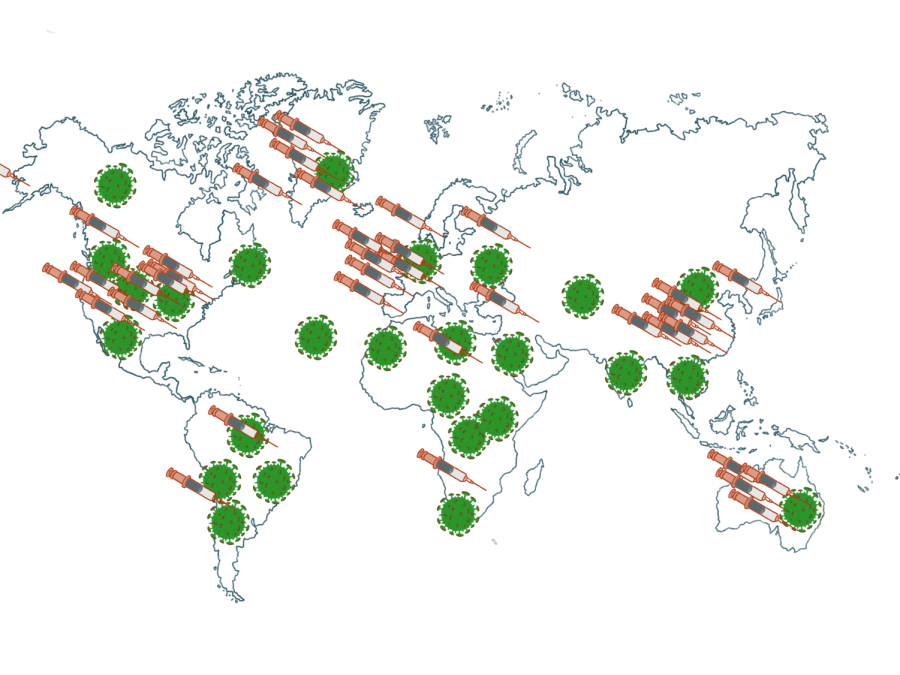COVID-19 Update
January 30, 2022
With a new year came a rise of COVID-19 cases both in the United States and around the world. The highly contagious Omicron variant, which was first discovered in South Africa in November 2021, has been spreading like wildfire. There have been a lot of people trying to get tested without much success. At-home tests are expensive and aren’t widely available, and in-person testing may increase the risk of infection. The Omicron variant isn’t always detectable through nasal tests, which partially defeats the purpose of these tests. However, nasal tests can still be somewhat beneficial when detecting other variants of COVID-19.
At the end of December, the CDC decided to shorten the quarantine time to 5 days instead of 10. If someone’s symptoms are gone after 5 days, they are allowed to stop quarantine as long as they wear a mask for 5 days. The CDC has also changed the rules for people who have been exposed to COVID19. For people who are unvaccinated, or who haven’t gotten their booster shot, it is recommended that they quarantine for 5 days, but if it’s not possible, they’re required to wear a mask at all times for 10 days. For those who have gotten their booster, they aren’t required to quarantine. Halina Smolen ’22 believes that this isn’t a good response to the virus, and says that “the CDC should not be cutting down on the isolation times just so people can get back to work sooner.”
The Pfizer booster shot was recently approved for people ages 12 and up.
In a New York Times article, a British study claims that the Omicron variant leads to less hospitalizations than other variants, especially for the vaccinated. For unvaccinated people, they have more severe symptoms, such as a fever or cough. For those who have already been vaccinated (if they’ve gotten at least two shots), it’s unlikely that they will get infected, but if they do, whatever symptoms they have are minimal.
Given that the third shot is proven to lessen symptoms and provide some protection from infection with newer variants, many countries are encouraging a booster dose. Israel has started to give a fourth dose of the COVID-19 vaccine, and France is considering allowing a fourth dose as well. Even though rich countries around the world have more access to the vaccines, many end up not using a lot of them, while poor countries are struggling to vaccinate their citizens. Around 65% of people are vaccinated on average in wealthy countries, while only an average of 3% are vaccinated in poorer countries. For example, Haiti has not vaccinated a single citizen, and many Haitians in the Dominican Republic were ineligible to receive it due to them not being citizens.
According to the CDC, the Pfizer booster shot was recently approved for people ages 12 and up. Many places are encouraging getting the booster shot, as it has been proven to help reduce the risk of infection. As of January 15th, only 62% of America has gotten a second shot, and 12% have only gotten one shot, leaving around 25% of the population completely unvaccinated. Elaine Wen ’24, believes that America isn’t doing as much as they could to enforce vaccination. She says, “It’s quite frustrating considering how America should be setting a precedent, not impeding progress.”
Only 62% of America has gotten a second shot, and 12% have only gotten one shot.
Schools around the country delayed the return of students, including Cambridge, and decided to add a few extra days to winter break while deciding what to do. Despite the surge in cases, many schools have not shut down, and have encouraged students to continue coming in person. Many believe that Massachusetts, as well as other places around the U.S., have not been handling this correctly. Elaine Wen ’24 says “I believe it’s because Massachusetts doesn’t want to go back online.” The continuation of in person learning can risk the spread of COVID-19, as well as harm immunocompromised students, teachers, and family members. Sidney Dexaus ’22 did not like online school, but feels like it’s the best option right now. She says it’s “beyond unsettling to go to school everyday and know there are students that have COVID.”
However, many people approve of in person learning because online school was not as good an option for many students. Jonathan Akbari ’22 said that “I feel as though being in person is doing wonders for my well-being. Talking to friends and having a normal year of school after the past 2 years being online is a relief.” Mahalet Asnake ’25 shares Jonathan’s beliefs, saying that “people seem to be doing better being back in person compared to when they were back online.”
Dr. Ijeoma Opara of Yale University told the Register Forum that “schools in Massachusetts and across the nation should be honest about whether they have the proper infrastructure to maintain in-person learning without putting children and teachers’ safety at risk. There should be online options for all schools. Strict measures like this in the short term are needed to address the pandemic in the long term.”
We’re almost two years into the pandemic and we all need to take the proper steps to ensure everyone’s safety and a return to in-person activities.










